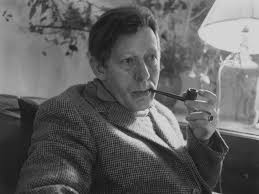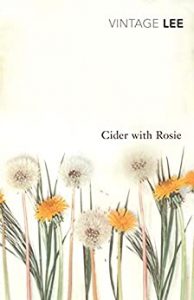This is a book which almost passed me by despite its lasting fame and popularity as an English curriculum text in secondary schools. I read it at Bishop Otter College where the Education department kept flinging out vague ideas for helpful wider reading. Cider with Rosie was top of their list because it tells the story of a childhood more or less from the point of view of a child – but of course it’s filtered though a long distance lens by the adult Laurie Lee looking back. He was 45 when Cider with Rosie was published in 1959. Another book they were keen on, for the same reasons, was The House of Elrig by Gavin Maxwell which I intend to reread soon.
64 years after it was published Cider with Rosie still feels startlingly fresh. Lee came from a large family growing up in the Cotswolds. The war and its aftermath are everywhere in Lee’s life because he was born in 1914. And it’s a time of great change. “The last days of my childhood were also the last days of the village. I belonged to that generation which saw, by chance, the end of a thousand years’ life” he writes going on to recall “a world of hard work and necessary patience, of backs bent to the ground, hands massaging their crops, of waiting on weather and growth; of villages like ships in the empty landscape and the long walking distances between them.” He remembers roads “innocent of oil or petrol” and observes that “the horse was king.” But it all changed in the 1920s.
He presents characters so evocatively that you could reach out and touch them: his otherworldly mother, for instance, who muddles through single-handedly raising her husband’s four children as well as her own three. He has long since deserted her although poignantly, while he’s alive, she never loses hope that he’ll return. The warmth and camaraderie is beautiful: the sisters who, effectively, bring Laurie up, the brothers he rubs along with, the school and the rural pursuits children amuse themselves with when there’s no TV or “entertainment” of any sort. Yet the young Laurie somehow learns violin and, of course, he reads.

Laurie Lee was a fine poet and that’s really his great legacy although I expect it was Cider with Rosie and its sequels which paid his bills. I taught and loved lots of Laurie Lee poetry – with Sunken Evening and Cock Pheasant being two of my all time favourites. His poetry is vibrantly sensual and actually, I realise now, so is his prose. He describes two elderly neighbours as having “sickle-bent bodies, pale pink eyes and wild wisps of hedgerow hair”. When he recalls the low level sex games he played with a girl named Jo when he was 11 or 12 his erotic scene setting includes “The old red trees through arches above us, making tunnels of rusty darkness”. Playing with the village boys on a glitteringly cold day he remembers the “stream in the valley, black and halted, a tared path threading through the willows”. It really is intensely vivid writing, astonishingly full of youthful joie de vivre and awe.
It also feels very honest and truthful as Lee tells us, for example, about his gossipy trio of elder sisters who eventually got jobs and married and his uncles, all damaged World War One survivors.
 Yes, I suppose those college people were right. Cider with Rosie does reveal something of how children feel, what they experience and how they are affected by what happens around them. It is also a masterclass in how to write colourfully compelling autobiography.
Yes, I suppose those college people were right. Cider with Rosie does reveal something of how children feel, what they experience and how they are affected by what happens around them. It is also a masterclass in how to write colourfully compelling autobiography.
Next week on Susan’s Bookshelves:
Gerard Manley Hopkins: Poems and Prose (Introduction and notes by WH Gardner)